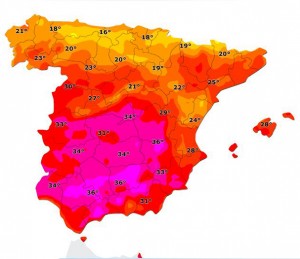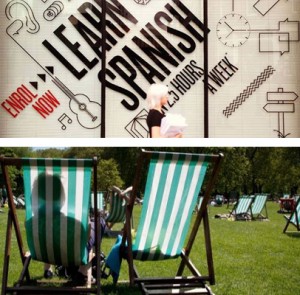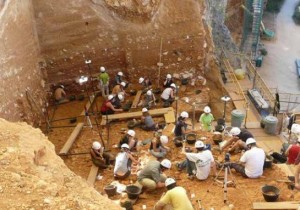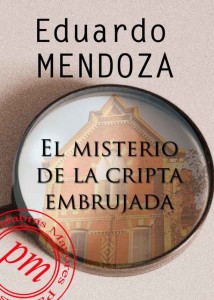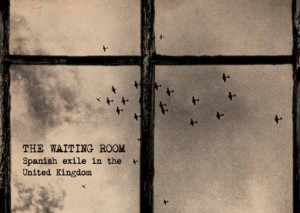12 destinos en 12 meses donde practicar español: agosto / 12 destinations in 12 months where to practise Spanish: August
En agosto, sin duda, únete a la batalla en la Tomatina de Buñol el 26 de agosto. Este evento conocido en el mundo entero es parte de la semana de fiestas de Buñol.
La guerra de tomates comenzó por error en 1945 y se organiza de manera oficial desde 1980. Al haberse convertido en una festividad de interés turístico internacional, desde 2013 hay que pagar entrada y cruzar los dedos para conseguir una de las plazas. La batalla de tomates dura exactamente una hora, con inicio y fin marcados, y la locura que se desata durante ese tiempo contribuye a mantener las calles limpias como una patena el resto del año – la acidez del tomate las desinfecta a fondo.
Cuando termine, recuerda que a 30km se encuentran las preciosas playas valencianas – y agosto es un mes especialmente inclinado a playas.
______________________________________________________________
In August, without a doubt, join the Tomatina battle in Buñol (Valencia, Spain) on 26 August. This world-renowned, hour-long event is a part of Buñol’s founding festivities.
The tomato battle started by accident in 1945, and it has been an official, government-organised event since 1980. Having become a festivity of international interest, in 2013 it became compulsory to pre-register and wait, hoping to be one of the few thousands chosen names to take part. The event lasts exactly one hour (start and end marked very clearly), and the wonderful chaos concentrated within that 1-hour time frame contributes, among other things, to keeping the streets of the city clean as a whistle the rest of the year – the acidity in the tomatoes disinfects the surfaces it touches.
When the party is over, remember the beautiful beaches of Valencia are just a 30-km ride away – and August is particularly fond of beaches.
Los últimos cursos intensivos este verano / The last intensive courses this summer
Agosto es en Europa un mes especialmente cálido, sobre todo en el sur; en España, las altas temperaturas y el turismo nacional e internacional -intensificado durante todo agosto- han hecho de este mes una época de vacaciones generalizadas. Tiene mucho que ver también la cercanía de septiembre: la vuelta a la rutina laboral, el comienzo del curso escolar… En agosto se queman los últimos cartuchos para recargar pilas y prepararse para la nueva temporada. ¿Cuál es tu actividad preferida en agosto? ¿Para qué te gusta aprovechar este mes? Estamos deseado escucharte en comentarios.
Pero no se trata solo de «este año, ¿playa o montaña?»; agosto es para muchos el momento de cumplir un propósito pendiente, a menudo relacionado con viajes, visitas e idiomas. Para hacerlo posible, el próximo lunes 3 de agosto comienzan los últimos dos cursos de la temporada de verano: el intensivo de 30h de una semana de duración, y el semiintensivo de 30h, que dura dos semanas. Puedes encontrar detalle de los dos en nuestro calendario de verano.
¿Te animas? Podrás centrarte en tu propósito lingüístico durante un par de semanas, y hacer una escapada al sur del Pirineo antes de que llegue septiembre para poner en práctica lo aprendido.
__________________________________________
August is a particularly hot month in Europe, especially in the south; in Spain, the rising temperatures, as well as a surge in local and international tourism -intensified throughout the month- make this time of the year a widely considered «holiday month». Such fact also has to do with September being around the corner: returning to work routines, starting school… August is when the last dice are rolled to recharge batteries and get ready for a new season. What is you favourite thing to do in August? What do you use the month for? We would love to hear about it in comments.
But August is not only about «what is the plan this year, the coast or the mountain?»; to many, it is the time to fulfill a resolution, one often connected to travelling, visiting places and learning languages. To make this possible, this coming Monday 3 August we are teaching the last two Spanish courses of the summer season; a 30-hour crash course, which lasts 1 week, and a 30-hour intensive course, the latter being 2 weeks long. Information on both is available in our summer course calendar.
Up for it? It could mean focusing on your language-related resolution for a week or two, then taking a quick break south of the Pyrenees before September kicks in to put the learned skills to use.
Haz un curso de español este verano – Take a Spanish course this summer
¡Aprovecha tus vacaciones para aprender un nuevo idioma! En nuestro centro de Londres ofrecemos cursos de español para estudiantes de todos los niveles, desde principiante absoluto hasta perfeccionamiento (A1 – C2 del MCER), cuyo objetivo es desarrollar tu capacidad de comprender, hablar, leer y escribir en español. Si no tienes mucho tiempo o prefieres aprender español a otro ritmo, puedes optar por un curso intensivo o semi-intensivo, también disponibles en julio y agosto.
Asimismo, mantenemos la matrícula para el DELE de noviembre abierta a lo largo de todo el verano, y ofrecemos un amplio abanico de cursos específicos, como los cursos por Internet del Aula Virtual de Español (AVE), cursos de traducción, interesantes cursos de literatura y conversación, y otros centrados solo en el desarrollo de la expresión oral. También organizamos cursos a la carta para grupos privados o empresas, previo contacto.
Puedes consultar toda la oferta académica de verano aquí. Para más información sobre fechas y matrícula, visita nuestra página web www.londres.cervantes.es o contacta con nuestra oficina de matriculación; estamos a tu disposición de lunes a sábado, en cenlon@cervantes.es y el número de teléfono 0207 235 0353.
Use your holiday to learn a new language! We are keeping our London centre open and offering Spanish language courses for all levels, from complete beginners to proficiency (A1 – C2 of the CEFR), aimed at developing your ability to understand, speak, read and write in Spanish. If you do not have much time, or you prefer to learn Spanish at a different pace, you can take one of our intensive or semi-intensive courses, also available in July and August.
Likewise, we are keeping the deadline to enrol in the November DELE exams open throughout summer, and offering a wide range of specific courses such as online Spanish courses (AVE), translation courses, interesting literature and conversation courses, and others focused purely on speaking skills. Private and corporate tuition is also available on demand.
You can see our full summer programme here. For further details on course content and enrolment, please visit our website www.londres.cervantes.es or contact our Enrolment Office; we are available Monday through Saturday on cenlon@cervantes.es and 0207 235 0353.
Así hemos celebrado el Día E 2015 – This is how we celebrated Día E 2015
El Día E, la fiesta de todos los que hablamos español (este año celebrada el sábado 20 de junio), ha unido a todos los centros Cervantes del mundo en la labor de dar a conocer la belleza del idioma español y demostrar el crecimiento personal y profesional que acarrea su dominio. Lo hemos celebrado con descuentos y concursos, actuaciones en vivo, tests de nivel gratuitos y mucha, mucha diversión. Aquí un video-resumen del Día E en nuestro centro de Londres:
_____________________________________
The Día E, celebration day for all those who speak Spanish, took place on 20 June this year. Instituto Cervantes centres of the world came together to show the beauty of the Spanish language and give first-hand evidence of the personal and professional development that learning Spanish entails. We celebrated with discounts and draws, live performances, free Spanish level tests and much fun. Here is a video-summary of Día E at our London centre:
Día E, la fiesta de todos los que hablamos español – Día E, celebration day for all those who speak Spanish
Hoy es el día de todos los hispanohablantes del mundo, lo hayamos aprendido en casa o en una escuela de idiomas. No importan los orígenes, hoy solo importa el medio de comunicación que nos une; el español, la lengua hablada por 548 millones de personas en nuestro planeta.
¡Celebra esta cifra con nosotros! Ven a visitarnos a lo largo del día a 102 Eaton Square, London SW1W 9AN, aprovecha los descuentos especiales en cursos de español, válidos solamente hoy, y participa en cualquiera de los eventos de abajo, incluyendo numerosos sorteos y regalos (para algunos eventos es necesario el registro previo; programa completo y detalles aquí).
_______________________________________
Today is the day of all Spanish speakers worldwide, whether it was learned at home or in a language academy. Roots are unimportant – today, it is all about the means of communication that holds us together; Spanish, the language spoken by as many as 548 million people in the world.
Celebrate this ever-growing figure with us! Come visit us at 102 Eaton Square, London SW1W 9AN during the day, take advantage of the special enrolment discounts available only today, and take part in any of the events below, including numerous contests and gifts (some events require registering in advance; full programme and details are available here).
El español en Eurovisión; música y letra – Spanish in Eurovision; music and lyrics
Eurovisión ha cumplido este año su 60 aniversario, estrenando nueva sección y título en el libro Guinness de los récords por ser el programa de televisión más longevo del mundo. La buena noticia es que el nuevo título se quedará en suelo europeo durante mucho tiempo. Felicidades a Suecia por una canción muy actual, que ha sido ampliamente aceptada y se ha alzado con el título ganador. Felicidades también a la segunda posición, Rusia, por su melodía potente interpretada por una voz igualmente potente.
Sin embargo, hoy queremos hablar de Edurne y la representación de España en el festival. España ha sido uno de los países que han utilizado su lengua oficial para componer y cantar su canción. Como la música es una manera apasionante de aprender cualquier idioma, queremos compartir una grabación del tema español “Amanecer”, interpretada lejos del escenario de Viena, en la intimidad de una sala con orquesta sinfónica. Disfrútala – y si te motiva, sigue atento/a a nuestro curso Music To Your Ears, previsto para otoño.
Amanecer
Se fue sin saber que yo sí lo amé, se fue sin creer en mí
Perdí la razón, sangré tanto amor que aún hoy siento el vacío
Me lleva contigo
Mi corazón me susurró: “a mí no vuelvas sin su amor “
Camino al ayer, allá donde estés, hoy reto al olvido
Se fue sin saber que yo no me rindo
Mi corazón me susurró: “a mí no vuelvas sin su amor “
Devuélveme el alma en pie, devuélveme el amanecer
Tú vuelves conmigo
Mi corazón me susurró: “a mí no vuelvas sin su amor “
Devuélveme el alma en pie, devuélveme el amanecer
________________________________________
Eurovision turned 60 this year, opening a new chapter in the Guinness book of records, where it holds the recognition for being the longest-standing television program in the world. The good news is Europe will be holding this title for many years to come. Congratulations to Sweden for a widely accepted and very modern song that won the song contest. Also, congratulations to Russia for delivering such a powerful melody via an equally powerful voice.
Nevertheless, today we would like to focus on Edurne and the Spanish representation on the festival. Spain was one of the countries who used their official language to pen and deliver their song. As music is a thrilling way to learn a foreign language, we would like to share a version of the Spanish song Amanecer, performed not on stage in Vienna, but instead in the privacy of a hall with a symphonic orchestra. Enjoy – and if it motivates you, check out our Music To Your Ears course in autumn.
Amanecer
Se fue sin saber que yo sí lo amé, se fue sin creer en mí
Perdí la razón, sangré tanto amor que aún hoy siento el vacío
Me lleva contigo
Mi corazón me susurró: “a mí no vuelvas sin su amor “
Camino al ayer, allá donde estés, hoy reto al olvido
Se fue sin saber que yo no me rindo
Mi corazón me susurró: “a mí no vuelvas sin su amor “
Devuélveme el alma en pie, devuélveme el amanecer
Tú vuelves conmigo
Mi corazón me susurró: “a mí no vuelvas sin su amor “
Devuélveme el alma en pie, devuélveme el amanecer
Hay-On-Way Festival 2015 en el Instituto Cervantes de Londres: Roberto Ampuero y «El caso Neruda» – Hay-On-Way Festival 2015 at Instituto Cervantes London: Roberto Ampuero and The Neruda Case
El prestigioso autor chileno Roberto Ampuero nos visitará el próximo martes 26 de mayo para presentar su último trabjao, «El caso Neruda», que acaba de ser traducido al inglés. Ampuero también nos hablará sobre su carrera y las vivencias que han inspirado su trabajo.
Nacido en Valparaíso, Roberto Ampuero ha publicado varios best sellers, entre ellos «Pasiones griegas», elegido en China como el mejor libro escrito en español en 2006; «Los amantes de Estocolmo», libro del año en Chile en 2003, y la pieza de ficción autobiográfica «Nuestros años verde olivo», aclamada por el Nobel de Literatura Mario Vargas Llosa.
A Roberto se le conoce por su personaje, el detective privado Cayetano Brulé, que aparece en las novelas «Cita en el azul profundo» (2004) y «Halcones de la noche» (2005). Ha habido un nuevo título que se ha añadido a esta colección con posterioridad, rompiendo el orden cronológico de los eventos en la vida del detective: «El caso Neruda» (2008), publicada recientemente en inglés por Souvenir Press (2012).
El último trabajo de Ampuero es «Detrás del muro» (2014), que trata sobre su exilio en la República Democrática Alemana (GDR). Su trabajo se desarrolla en Latinoamérica y España, y varias traducciones han sido publicadas en Croacia, China, Francia, Italia, Grecia, Portugal, y ahora el Reino Unido. El autor ha vivido en Chile, Cuba, la ex-GDR, actualmente unificada Alemania, Suecia, Estados Unidos -donde fue profesor en la Universidad de Iowa- y México, donde ejerció el cargo de embajador de Chile.
La presentación de «El caso Neruda», que se realizará en inglés, ha sido organizada por la embajada de Chile en el Reino Unido. Tendrá lugar en nuestro salón de actos el martes 26 de mayo a las 18:30h. La entrada es libre, pero se requiere reservar asiento con antelación, bien por correo electrónico en reservas.londres@cervantes.es o bien por teléfono, en el 0207 201 0752.
_____________________________
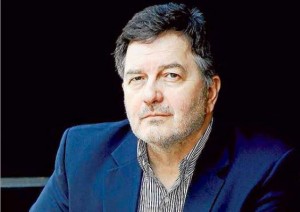
The acclaimed Chilean writer Roberto Ampuero will come by on Tuesday 26 May, to present his latest book The Neruda Case, which has just recently been translated into English. Ampuero will also talk about his career and the experiences that have proved an inspiration to his work.
Born in Valaparaíso, Roberto Ampuero has published a series of best sellers, amongst them Greek Passions, voted by the Chinese in 2006 as the best novel written in Spanish; Stockholm Lovers, book of the year in Chile in 2003, and the autobiographical fiction Our Olive Green Years, praised by Nobel Prize winner Mario Vargas Llosa. He is famous for his character, private detective Cayetano Brulé, who appeared in the novels Date in the Deep Blue (2004) and Night Hawkes (2005). Another exceptional novel was incorporated to this series, thus breaking the chronological order in the life of the detective: The Neruda Case (2008), recently published in English by Souvenir Press (2012).
Ampuero’s latest book is Behind the Wall (2014), which talks about his exile in the German Democratic Republic (GDR). His work circulates in the whole of Latin America and Spain, and several translations have been published in Croatia, China, France, Italy, Greece, Portugal and now The United Kingdom. The author has lived in Chile, Cuba, the ex-GDR, currently unified Germany , Sweden, the United States, where he taught at Iowa University, and Mexico, where he was the Chilean ambassador.
The presentation of The Neruda Case, which will be held in English, has been organised by the Embassy of Chile in the United Kingdom. It will take place on Tuesday 26 May at 6:30pm at our premises. Admission is free, though it is essential to book your place beforehand, either by email on reservas.londres@cervantes.es, or by phone on 0207 201 0752.
La Prehistoria y la maleta del arqueólogo – Prehistory and the archaeologist’s suitcase
Nuestro taller-conferencia del próximo sábado 23 de mayo a partir de las 15:30h tiene el objetivo de reflexionar sobre la evolución de la raza humana en Europa, partiendo de la supervivencia de las especies que habitaron las cuevas de la Sierra de Atapuerca. Se analizarán la relevancia arqueológica, historia y localización geográfica de este emplazamiento. Los asistentes al taller vivirán en primera persona las prácticas y experimentos prehistóricos, llevados a cabo siguiendo los patrones y empleando las habilidades de nuestros ancestros europeos. El arqueólogo Marcos Terradillo Bernal y la antropóloga Verónica Martín Arroyo, miembros de la Fundación Atapuerca, serán los encargados de dirigir el taller.
____________________________________________
Our ancient history workshop and conference, taking place on Saturday 23 May from 3:30pm, has been put together in order to reflect on the human evolution in Europe, starting with the survival of the different species that populated the caves of Sierra de Atapuerca. The archeological importance, the history and the geological factor of this settlement will be reviewed. The attendants to this workshop will experience the prehistoric practises and experiments built following the patterns and skills of our European ancestors. The workshop will be run by Marcos Terradillo Bernal, archaeologist, and Verónica Martín Arroyo, anthropologist, both members of Fundación Atapuerca.
Nueva tarea en el Club Virtual de Lectura – New Virtual Reading Club assignment
Les invitamos de nuevo a formar parte del Club Virtual de Lectura del Instituto Cervantes. ¡Disfrutará enormemente!
Se trata de un servicio que ofrece compartir opiniones con otros usuarios de bibliotecas del Instituto Cervantes de todo el mundo en torno a una obra de la literatura española o hispanoamericana a través de una plataforma de lectura en Internet, y que funciona de modo similar al de las redes sociales.
Requisitos:
-Dominio del español;
-Tener vigente el carné de biblioteca.
La próxima lectura será del 4 al 15 de mayo: «El misterio de la cripta embrujada», de Eduardo Mendoza
(del 4/5/2015 al 15/5/2015)
Para más información, consulte la normativa del Club Virtual de Lectura o escriba a club.virtual.lectura@cervantes.es.
¿Cómo inscribirme? Tutorial de acceso
____________________________________________________
We insist: come join the Instituto Cervantes Virtual Reading Club. You will enjoy tremendously!
The aim of this service is to provide an environment where you can share your views on a given Spanish or Latin American Literature title with other Instituto Cervantes library members across the world, via an Internet reading platform. It works in a similar way to social media networks.
Requirements to join:
-to be fluent in Spanish;
-to have a valid Instituto Cervantes Library card.
Next reading will take place 4 to 15 May: El Misterio De La Cripta Embrujada, by Eduardo Mendoza
(4/5/2015 – 15/5/2015)
For further information, please check the Virtual Club regulations or write to club.virtual.lectura@cervantes.es.
How to register? Tutorial
The Waiting Room. El exilio español en el Reino Unido – The Waiting Room. Spanish exile in the United Kingdom
Muchos exiliados españoles llegaron al Reino Unido en la primera mitad del siglo XX. Atrapados entre dos guerras, percibieron su propio traslado como algo temporal, aunque para algunos se convirtiera en permanente.
Este proyecto repasa la contribución intelectual de los que llegaron a este país, y presenta su historia como parte intrínseca de la historia de Gran Bretaña. ¿Sería posible, a día de hoy, concebir la idea del exilio fuera del contexto de condición forzosa? ¿Podría esa reformulación dar pie a una nueva realidad, en la que ciudadanos globales cruzasen fronteras e interactuasen con otras culturas con normalidad?
The Waiting Room, a lo largo de dos meses de música, cine, literatura, documentales, charlas y arte, intenta profundizar en estas cuestiones vitales sobre el exilio, la memoria y la identidad, culminadas en una ciudad tan extraordinaria como Londres.
The Waiting Room es una exhibición gratuita, abierta del 27 de abril al 30 de junio de 2015 en nuestro centro en 102 Eaton Square, London SW1W 9AN.
______________________________________________________________
Spanish exiles arrived in the UK in the first part of the XX century. Trapped between two wars, their presence was a period of transition that, for some, became permanent.
This project serves to introduce a dialogue about the intellectual contribution of those who came to this country, and to present their story as part of the very history of the UK. Would it be possible today to rethink the notion of exile beyond its typical association of being a forced condition? Could that formulation give place to the creation of a new outcome, a global citizen able to transit among borders and cultures?
The Waiting Room, through two months of music, cinema, book, documentary, talks and art, intends to explore these vital questions around exile, memory and identity, highlighted by a city as extraordinary as London.
The Waiting Room is an open and free exhibition, taking place on 27 April through 30 June 2015 in our centre on 102 Eaton Square, London SW1W 9AN.

